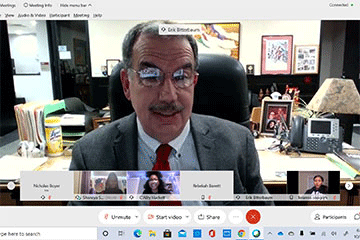
10/27/2020
Members of the Cortland Black Student Union (BSU) and Cortland Black Lives Matter couldn’t meet in person to hold their planned Blackout March for Justice on Monday, Oct. 26.
They met online for COVID-19 safety reasons. During their virtual conference from 6 to 8 p.m., their unified stand against racial injustice began with a singing of the Black National Anthem by Rebekah Barrett of Ithaca, N.Y, a senior dual majoring in Africana studies and sociology whose vocals have marked other formal ceremonies on campus.
SUNY Cortland President Erik J. Bitterbaum then delivered an address that touched on the death of George Floyd, which has sparked an ongoing national dialog on racial injustice in America, and how the university can face the problem at hand.
“While this is a difficult time in our country, we need to be proactive and address these issues head-on, especially for the sake of our students,” Bitterbaum said.
He shed light on some upcoming projects on campus relating to equity and inclusion.
Bitterbaum noted that the Beloved Community Narratives project led by Adam Mastoon, involving 25 campus participants, is already being put on display. The contributors shared their stories with members of Mastoon’s team. The group then translated each individual’s story into a large poster. Ten student stories already are on display at the Student Life Center. Eventually, all 25 portraits will be installed in Moffett Center.
A website has been launched, publishing all 25 stories. Campus members can see them at Cortland.edu/beloved.
An opportunity will soon be presented to participate in a virtual panel discussion with the poster participants.
Also, a Black Lives Matter-themed mural will be coming to campus. The NAACP, BSU and Cortland art students will collaborate to create the portrait.
Furthermore, each Cortland academic department will create a plan to fight against racial injustice and inequality within the department.
“We are working to diversify the voices of our campus,” Bitterbaum said. “We recognize the strength we gain from the different views and world experiences that come from a campus rich in the diversity of our people.”
Next, Cortland BSU president, Shaneya Simmelkjaer of Bronx, N.Y., a senior triple major in criminology, political science and Africana studies, took the stage.
“I’ve had a hard time attempting to condense all the pain, suffering, heartache, and death that black people in America have experienced in 2020 alone, into one single speech,” Simmelkjaer said.
The Cortland senior titled her speech, “Tired of Being Tired, but the Fight is Far from Finished.” The discourse emphasized that the current racial tensions of the United States are not new.
“We’ve seen many George Floyds in our lifetime,” Simmelkjaer said. After a heartfelt and insightful speech, the BSU president passed the reins onto her vice-president, C’Ality Hackett, a junior biology major from Albany, N.Y.
Hackett displayed footage of Black Lives Matter protests in New York, fights between Black Lives Matter and “Blue Lives Matter” protestors, and Special Anti-Robbery Squad (SARS), a unit of the Nigerian Police Department, being abusive to Nigerian citizens.
Following the visuals of racial prejudice and tensions across the globe, Hackett opened the assembly for a group analysis of the videos. The collection of students, faculty and community members answered a few inquiries to facilitate a conversation.
Melissa Kiser of Cortland Black Lives Matter added to the dialogue, using her knowledge to examine how the racial climate of America correlates to the Cortland community.
The event concluded with a spoken word poem by Keona Gray-Outlaw, a senior professional writing major from Brooklyn, N.Y.
“I wanted to dedicate this piece to the disruptive peace that these murders have caused,” said Gray-Outlaw. “There’s no need for filtering my language in a society that has only one lens it looks through. This is just as raw, descriptive and painful as this feeling I’ve felt every day is.”
This is event is the latest for BSU, which has been active throughout the semester. Currently the 50-member organization hosts programs every Monday. Together, they hope to start a conversation among students, faculty and Cortland community members.
Thanks to the BSU, meeting participants were able to take a deep-rooted look at themselves, the campus community, and the country they share.
“We need to ask ourselves, ‘Is this who we are? How has our past led us to this place? And most importantly, where do we want to go this semester, and beyond?’” questioned Bitterbaum. “The answers to these questions will require the honesty and fortitude to reflect on the past, and the wisdom to the find a path forward.”
Prepared by Communications Office writing intern Nicholas Boyer